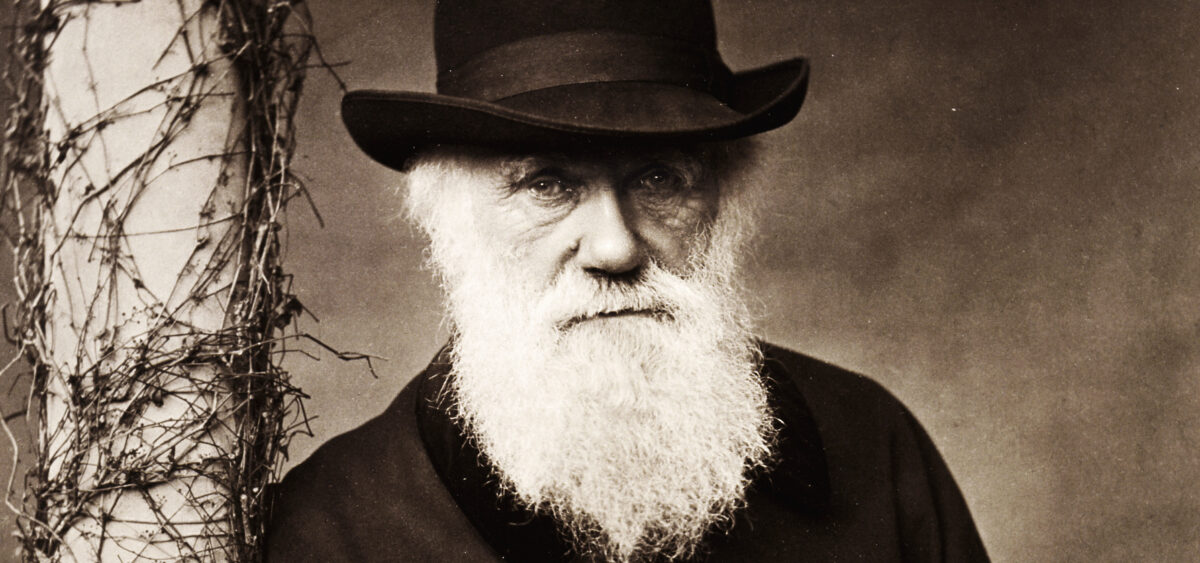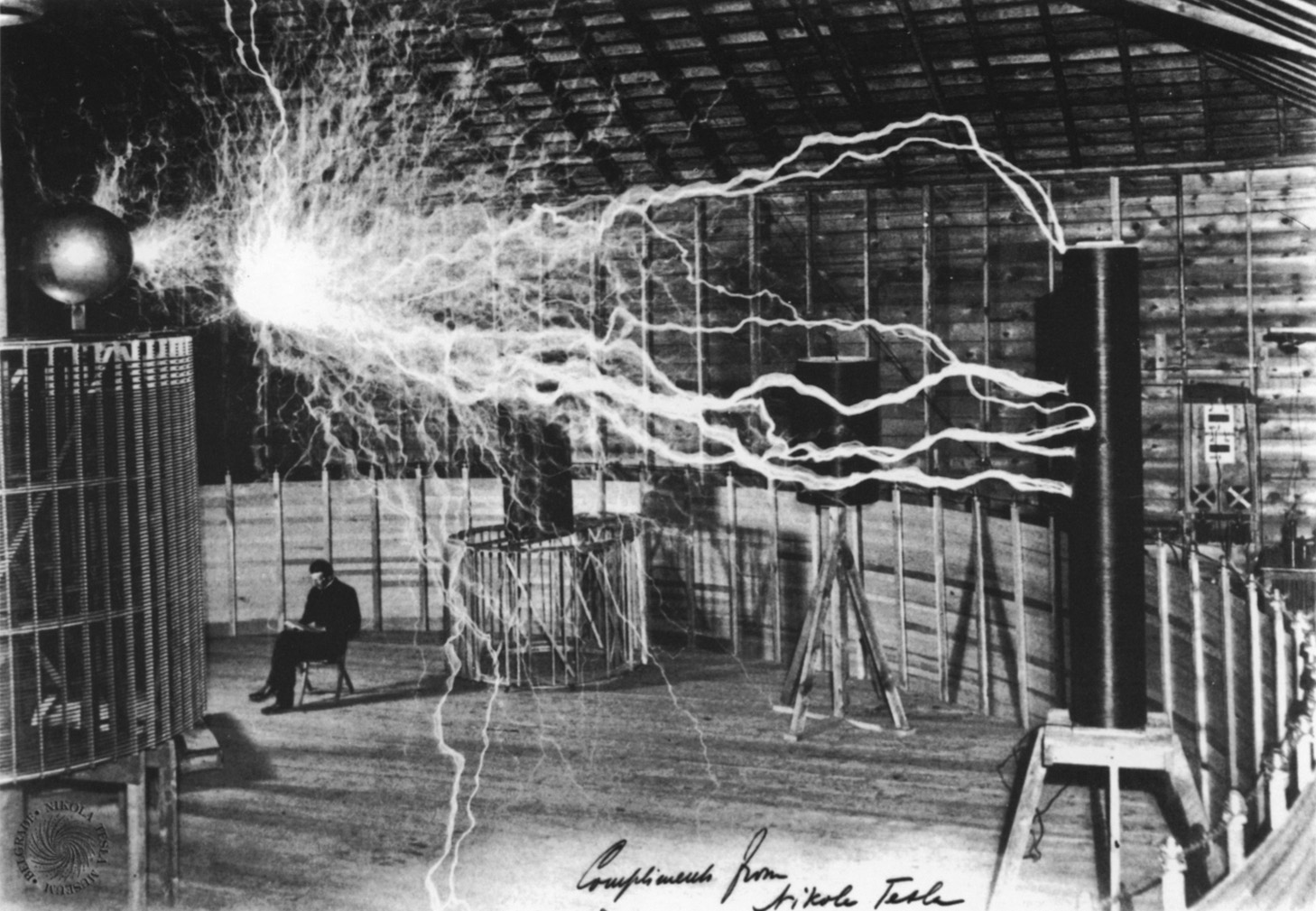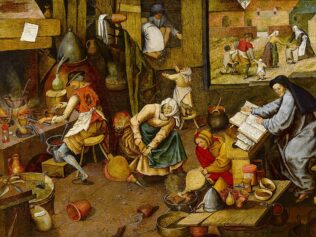
The creator of the theory of evolution believed that even though the constant fight for survival is a given in nature, our sense of kindness and beauty comes directly from animals, says cultural scientist and philosopher Justyna Schollenberger.
Aleksandra Gosk: If biology is a story about nature, Charles Darwin was the one to make humans part of its narrative. But who were our heroes (and those of Darwin) before the theory of evolution came along?
Justyna Schollenberger: We could say that Western philosophy is largely founded on separating humans from nature. This division distinguishes humans as beings gifted with skills and qualities animals were not believed to possess. Of course, it all started with ancient philosophy – this was how Aristotle defined humans. In modern times, it culminated in the philosophy of Descartes, who firmly denied animals reason and, in consequence, also the ability to experience any emotions. This very radical claim set the tone for the whole narrative about the place of humans in the world.
But Darwin came from the British tradition of empirical philosophy, which claimed that knowledge comes directly from sensory experience. This perspective granted him a different vision of humanity. Scotsman David Hume – the leading representative of empiricism – argued that animals do not use reason, but humans don’t use it in most of their endeavours, either. In his approach, both humans and animals are, first and foremost, creatures led through life by a nature that allows them to find their way through reality by recognizing the laws of cause and effect.
This intellectual context made it much easier for Darwin to come up with his breakthrough theories. When looking at Darwin, we must view him in the context of his era rather than as a lone genius, suddenly and spontaneously illuminated with revolutionary ideas. He came up with a coherent theory, and in that sense, he was a genius. Darwin presented a vision in which humans were inscribed in the natural order, blurring the line between human beings and animals – and even between animals and plants. But society was not very enthusiastic about his claims, on the contrary.
AG: Together with Alfred Wallace, Darwin presented the scientific community with the main principles of the theory of evolution before his book On the Origin of Species came out. However, not many people found them interesting. Perhaps it was Darwin’s writing talent, rather than scientific prowess, that made his theory a success.
We could read Darwin’s books as the works of a writer who created a narrative around the most important questions we could ask ourselves – about the beginning of the world, as well as the origins, nature and place of humans in the world. At the same time, Darwin was an author striving to remain approachable. His writing was never bland, he didn’t use the tone we know from today’s scientific discourse, with its ideal objectivity and conceptual purity in mind. One of the main problems with such a way of writing is the anthropomorphization of the processes described. When speaking about natural selection and its mechanisms, we automatically start looking for some purposeful force behind it. But Darwin says there is no recognizable plan that came from above. Natural selection is impersonal, purposeless and non-anthropocentric. That’s what makes his theory so intriguing and attractive – life goes on in accordance with mechanisms and rules we can explore and describe, but never predict. And it’s possible that we will never manage to describe it fully, because our language is naturally anthropocentric.
AG: Darwin’s works sparkle with humour and colourful anecdotes. However, some parts of his books might prove difficult for today’s readers, as we are now more sensitive to animal welfare.
It is particularly noticeable in his book The Voyage of the Beagle, first published in 1839. Darwin’s account of the journey became incredibly popular right after its publication. On the one hand, it was a typical example of travel literature of its time, but on the other, it also indicated that the voyage would lead to very ambitious conclusions. In this book, we get to meet Darwin as an enthusiastic naturalist and explorer. And yes, some excerpts are hard to read today: instead of showing us the abundant beauty of exotic nature, they highlight human brutality instead. On the Galápagos Islands, Darwin and the crew of the HMS Beagle encountered great tortoises, iguanas and birds that had never developed a fear of humans. What the naturalist and his men did there might shock the modern reader. The explorers ruthlessly exploited the gentle nature of the wild animals they encountered. Giant tortoises, which could easily evoke a sense of wonder, were treated like living cans of food. The travellers killed blue-footed boobies regularly and without mercy. As we know from the account of the Beagle’s captain Robert FitzRoy, Darwin participated in one of the booby slaughters – apparently blinded by a killing spree that took over the entire crew. In those moments, we learn more about humans than we do about other species.
It should be noted that in his scientific works, Darwin did not mention any of these gory stories, but he liked to include all kinds of anecdotes, often featuring himself, which made academic distance hardly possible. On top of that, we could accuse Darwin of anthropomorphizing animals and natural phenomena. Still, there is value in this kind of narrative. Darwin shows that research is never impersonal, and the scientist makes for an important part of the process. Such a way of describing his research on animals also allowed him to showcase, to some extent, the animals’ personalities as well. In Darwin’s texts, they are not just research objects. Instead, they get a chance to present themselves as the subject, even if they still meet a gruesome end.
AG: Does such an approach help us look at animals and notice some qualities traditionally reserved for humans, such as higher emotions?
Darwin wanted to prove continuity within the entire animal kingdom, to which he included humans. Not only did he speak of our links to animals, but he also proved that animals exhibit many of the traits we like to consider exclusively ‘human’. Darwin perceived animals as capable of higher emotions and a broad range of nuanced feelings: love, friendship, jealousy, sadness, anger. He recognized these emotions in the species we find close to us for various reasons, such as apes or dogs, and those we perceive as ‘lower-category’. However, in one of his journals, he explicitly wrote that there is no such thing as ‘better’ and ‘worse’ species, and that we should never make such distinctions.
Darwin was always fond of adorable little anecdotes. In Sexual Selection, for example, we can find a lovely story about snails. One snail informed its ailing companion that they should move to another garden with more food – and then one day, they went there together. Of course, it would be easy to accuse Darwin of anthropomorphizing these creatures again. In his narrative, the orders of observation, experiment and empathy – or maybe emotional involvement in his research – tend to overlap. He wrote that the more time he spends among animals, the clearer it seems to him that they act upon reason rather than instinct. Darwin distinguished humans as intellectually superior, but then he immediately reminded us that our abilities did not come from nowhere – and this exceptional nature of ours is not, in fact, as exceptional as we like to believe. All it takes is to stop watching ourselves so obsessively and start paying more attention to the animal world with its wealth and wondrous complexity. Darwin was a thinker who reminded us that we are historically and evolutionally entangled in relationships with other species and that we should view animals as conscious beings with both intellectual and emotional capabilities.

Tomasz Sitarz: He was also an excellent observer. Darwin noticed a whole spectrum of interactions between animals of one and different species. Does this world leave space for altruism and empathy?
The issue of empathy and altruism is important. The common interpretation of the theory of evolution takes us to the idea of social Darwinism, which claims that all human and cross-species interactions boil down to one basic rule: only the best-adapted – meaning the strongest – individuals will survive. The 19th century English poet Alfred Tennyson memorably wrote that nature is red in tooth and claw. This perspective was also promoted by his contemporary propagators of evolutionism, such as Thomas Huxley [Aldous Huxley’s grandfather – ed. note], also known as ‘Darwin’s bulldog’.
Darwin’s vision was more complex, though. Yes, there is a constant fight for survival, but when describing humans, Darwin says some of our most prominent qualities are reason and moral sense, based on our capacity for empathy. He believed this came from our animal ancestors and that it has its roots in the social instinct. Therefore, we cannot rule out the possibility that other species could also develop a moral sense. The naturalist made a fascinating proposition, claiming that our morality is not universal at all. Had other social species, such as bees, developed their own moral sense, we would surely follow different rules: “There can hardly be a doubt that our unmarried females would, like the worker-bees, think it a sacred duty to kill their brothers, and mothers would strive to kill their fertile daughters; and no one would think of interfering,” wrote Darwin. In this approach, morality was relative to a species.
TS: So what role does empathy play in our existence, according to Darwin?
He believed that social animals are the ones most capable of feeling empathy. This inclination is very useful as it helps the species to survive. Animals gather in tight-knit groups that are better prepared to handle any natural adversities. Of course, the capability for sympathy does not permeate the entire world of nature. We must remember that, sometimes, it would be unbearable and make it impossible for the species to act or even survive. For example, Darwin wrote about migrating birds who abandon their young and leave for their destination. He believed that if a swallow was granted human-like empathy, it could never bear the thought of leaving its nestlings for certain death. Sometimes, empathy and altruism stand in the way of the instinct of survival. Darwin once mentioned a beautiful story of baboons running away from a pack of hunting dogs. One baby baboon could not keep up with the rest of the pack, and desperately cried for help. Then a large male walked, brave and dignified, among the confused dogs and saved the baby. From Darwin’s perspective, the world is not a place where individuals are focused solely on survival at all cost. He also noticed that animals are capable of cooperation and considered this quality an exceptionally important one.
While it is not possible for us to precisely define the emotions and experiences of animals, we should not, says Darwin, assume they have none. He defined the limits of our cognition: “Who can say what cows feel when they surround and stare intently on a dying or dead companion?”
AG: On the one hand, he was a sensitive and tender observer who also opposed the idea of slavery. On the other hand, Darwin was an avid hunter.
So avid, that Darwin’s father expected him to die a miserable death. In order to save his son from a tragic fate, he kept on coming up with new career options for him. First, he wanted Charles to train as a doctor, but the boy could not stand the sight of blood and human suffering. The next option was to become a pastor, but it also didn’t work out. Finally, Robert Darwin allowed his son to embark on the HMS Beagle. Eventually, hunting did lose its appeal for Darwin. It began to repulse him already during his travels. He also expressed his reluctance towards causing suffering in his letters. He wrote that one of the noblest expressions of our morality is the humanitarian treatment of animals. The human capacity for empathy can grow – first, it only applies to a handful of loved ones, and later, it expands, including all living creatures. This sets us apart from other social animals, as they can only feel sympathy for the members of their pack.
However, Darwin’s opinions on this topic were challenged when he joined the dispute on the acceptability of vivisection. Darwin’s family friend Frances Power Cobbe was one of the leading anti-vivisection activists of that time. Together with Darwin’s wife Emma and his daughter Henrietta, she pressured him to express his view on the topic unambiguously. It must have been quite a problem for Darwin, as vivisections were usually carried out on dogs, and those animals were particularly dear to him. One of the main characters in his book The Expression of the Emotions in Man and Animals was, after all, a terrier named Polly, who features in most of his dog-related anecdotes. In the end, however, Darwin decided that the advancement of science outweighs the needs of a vivisected animal. He claimed that progress requires sacrifices, although he emphasized that vivisections should be carried out in the most humanitarian way possible and under anaesthetic.
AG: My favourite work of Darwin is his last book. In it, Darwin discusses animals that, even today, often seem to us devoid of emotions and reason alike. He gazed downwards to discover the wondrous world of earthworms.
Yes, an incredible work indeed, combining Darwin’s reflections upon human culture, geology and the behaviour of earthworms. His uncle, Josiah Wedgwood II, pointed out to him that earthworms make various specks of organic matter disappear from the ground. Darwin claimed that without these little creatures, there would be no life on Earth at all. Earthworms constantly eat, digest and excrete, turning dead matter into life-giving soil. They were the first creatures to ‘cultivate’ the land.
Darwin believed their activity was also crucial for preserving archaeological treasures. All the finest remnants of our culture would have never survived if not for the earthworms that allow various buildings and objects to remain in the ground undamaged. Without these worms, there would be no world as we know it. Darwin carried out detailed research on earthworms’ sense of sight, hearing, taste and smell, and concluded they are conscious creatures, led by more than just instinct. He noticed that earthworms can focus all their attention on one activity, and when they do so, it’s impossible to scare them until they become distracted. Darwin also ran tests on what kind of foods earthworms like best – horseradish leaves, cabbage, onion, raw meat – and whether they can hear various sounds. In his efforts to figure out the latter, he had his son Francis play for them on a bassoon. Earthworms ignored the music, but when Darwin placed their jar on the piano, they burrowed in the soil, alarmed by the instrument’s vibrations.
This approach is very close to the post-humanist perspective, in which humans no longer occupy a central position and are entangled in various relationships with other living creatures. Such a vision is very attractive, but also somewhat grotesque – Darwin makes us realize to what extent our existence depends on these tiny underground creatures. At the same time, when looking at earthworms, he feels awe rather than disgust. It would be hard to arrive at a more wonderful conclusion than his: that we owe the world as we know it to the persistent, tireless work of tiny earthworms.
TS: I find it interesting that Darwin believed animals capable of recognizing and creating beauty – something that, even nowadays, is considered a typically human domain.
When contemplating the fabulous plumage of male birds, Darwin claimed that it is caused by the repeated aesthetic choices of females. The conscience and preferences of animals affect and shape the beauty in the world around us. Darwin explained his view by saying that if a traveller from another planet watched young men court a girl in some village market square, they would soon come to the same conclusion.
In traditional narratives, an aesthetic sense is something inherently human. However, Darwin insisted that this sense, expressed through the most sophisticated pieces of art, is animalistic at its core. Our beauty standards are the same as what is considered beautiful in nature. It brings us to many strange levels of entanglement of things various species view as attractive. Of course, such an approach was widely criticized – John Ruskin, the leading Victorian theorist of aesthetics, called Darwin’s opinions hellish visions that degrade humans to the level of animals. Indeed, Darwin was sometimes quite ruthless in his descriptions of humans, but he also moderated his theses by claiming that our sense of aesthetics is rooted in a wealth of abilities and high levels of consciousness that came from the animal world.
TS: Even today, when discussing the origins and position of humans in the world, not everyone is pleased with the conclusions. Thanks to the advancement of biology, we can now prove that animals deserve to be recognized as our close relatives, with whom we coexist in a complex net of relationships between the kingdoms of plants, fungi, bacteria and protozoa. It makes me wonder how Darwin would react upon hearing that some people still refuse to acknowledge this truth.
In his works, Darwin expressed his faith in the development of thought and morality. He stressed the importance of scientific advancement, even though it wasn’t always easy for him, as the argument over vivisection shows us. Darwin might be surprised to see humans are still so eager to differentiate between themselves and other animals, rejecting so many well-founded conclusions. In a way, he employed the entire animal world to confirm his theory, showing that to speak against it is simply unreasonable.
Justyna Schollenberger:
A cultural scientist and philosopher, researching the relationships between humans and non-humans. She works in the Institute of Polish Culture at the University of Warsaw.










